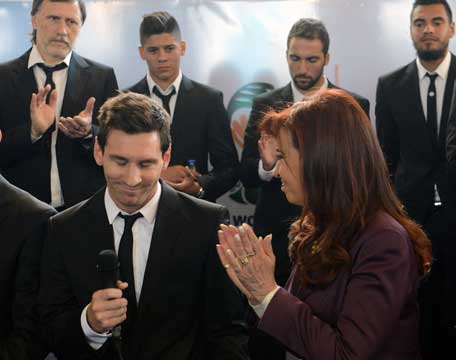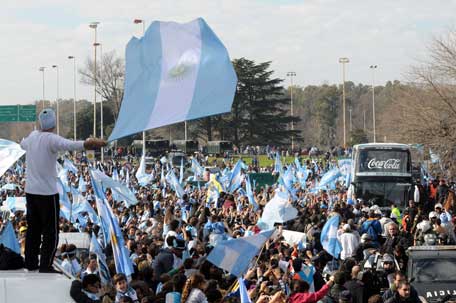- City Fajr Shuruq Duhr Asr Magrib Isha
- Dubai 04:33 05:50 12:21 15:48 18:46 20:03

Argentine President Cristina Fernandez de Kirchner applauds next to soccer player Lionel Messi as Argentina's national soccer team arrives at the Argentine Football Association (AFA) in Buenos Aires, in this July 14, 2014 handout picture provided by the Argentine Presidency. (REUTERS)
A crestfallen Lionel Messi kept a low profile as thousands welcomed the Argentina squad home Monday after a World Cup final defeat to Germany.
Television networks carried live coverage of the Aerolineas Argentinas plane -- painted in the blue-and-white colors of the flag with the words "Thank you Argentina"as it touched down in Buenos Aires, where about 500 fans braved the cold to meet the flight from Rio de Janeiro.
Argentina soccer fans cheer as they wait for the arrival of their team to Buenos Aires, Argentina, Monday, July 14, 2014. Fans came out to welcome home Argentina's team after it was defeated 1-0 by Germany at the Brazil World Cup final match on Sunday. (AP)
Thousands more fans lined the team's route from the airport, waving flags and swarming the convoy of three buses, which moved at a snail's pace through the crowds.
A crowd of Argentinian fans greet their national football team upon their arrival, near Ezeiza, province of Buenos Aires, Argentina after playing against Germany in the World Cup Brazil 2014 final, on July 14, 2014. (AFP)
Nationwide, the atmosphere was one of pride as much as disappointment after the team forced Germany into extra time in a hard-fought 1-0 match in Rio de Janeiro's Maracana Stadium.
"I just want to thank everyone for the welcome," Messi, who spent much of the day with a pained look on his face, told a reception with President Cristina Kirchner at the offices of the Argentine Football Association.
"I would have liked to have brought home the Cup and enjoyed it with you (the country). We gave everything we had but we just didn't manage it."
Kirchner met the team with hugs and tried to get a smile out of them, teasing striker Gonzalo Higuain, forward Ezequiel "Pocho" Lavezzi and winger Angel Di Maria, among others.
Argentina's soccer team arrives in a bus as fans gather to welcome them home in Buenos Aires, Argentina, Monday, July 14, 2014. Argentina was defeated 1-0 by Germany at the the Brazil World Cup final match on Sunday. (AP)
She drew laughs when she told Higuain he should go to the doctor for an MRI scan after German keeper Manuel Neuer crashed into him in the second half, an incident the referee controversially waved away.
Kirchner tried hard to provoke a blush from Lavezzi and Di Maria, often described as the team's best-looking members.

Argentina President Cristina Fernandez de Kirchner (R) applauding striker Lionel Messi (L) during their welcoming ceremony from the World Cup where they ended up in second place. AFP
"Pocho, come here, they say you're the sex symbol of the team," she told Lavezzi, trying to persuade him to say a few words.
"Di Maria, come here, the girls are asking for you." But the players were reluctant to take the microphone, and the smiles were fleeting.
"It's very nice when people recognize what you do. We would have loved to bring home the Cup but we weren't able to," said Lavezzi.
 (AFP)
(AFP)
Euphoria over
As the curtain fell on two-time champion Argentina's campaign to win its first World Cup title since 1986, the bleaker side of national life returned to the foreground.
The economy is in a slump and the government risks defaulting on its debt.
An Argentine fan stands between policemen as fans gather to welcome the Argentina national soccer team outside the Argentine Football Association (AFA) after Argentina lost to Germany in their 2014 Brazil World Cup final soccer match, in Buenos Aires, July 14, 2014. (REUTERS)
"The issues worrying Argentine society didn't disappear during the World Cup, they just had less relative importance," said sociologist Ricardo Rouvier. "Now interest in the World Cup will wane a little each day. People will slowly get off the bandwagon."
Signs that the party was over did not take long to appear.
Immediately after Sunday's match, tens of thousands of revelers descended on Buenos Aires's iconic Obelisk monument, determined to celebrate despite the bittersweet end of the nation's World Cup campaign.
But after several hours of partying, dozens of hardcore fans known as "barras bravas" clashed with police and went on a destructive looting binge.
Police arrested around 120 people over the violence, which left 70 wounded, including 15 officers. One rioter in serious condition with a punctured lung, officials said.
A fan of Argentina sits on a traffic light post as he waits for the arrival of Argentina's national soccer team in downtown Buenos Aires July 14, 2014. Fans gathered to welcome home the national team on Monday after their 1-0 loss against Germany in overtime at the 2014 World Cup final in Brazil on Sunday. (REUTERS)
Violence also broke out in the cities of La Plata and Mar del Plata, the government said.
On Monday afternoon, unrest erupted again in the area around the Obelisk after a planned appearance by the team was canceled and some of the thousands of people who had gathered started throwing bottles and stones.
Still, overall, Argentines were proud of their team for making their first World Cup final since 1990.
"They gave everything for us and they deserve our support," said Matias Ruiz, 17, one of those who welcomed the squad at the airport.
![]() Follow Emirates 24|7 on Google News.
Follow Emirates 24|7 on Google News.